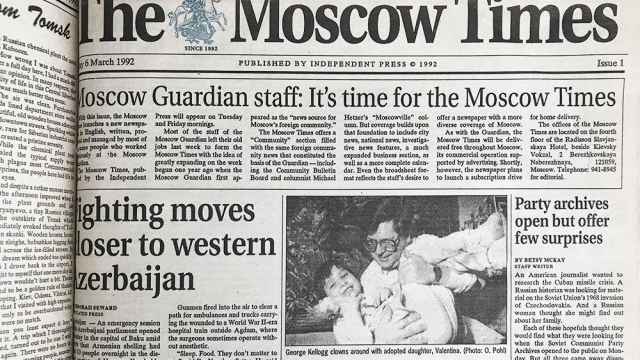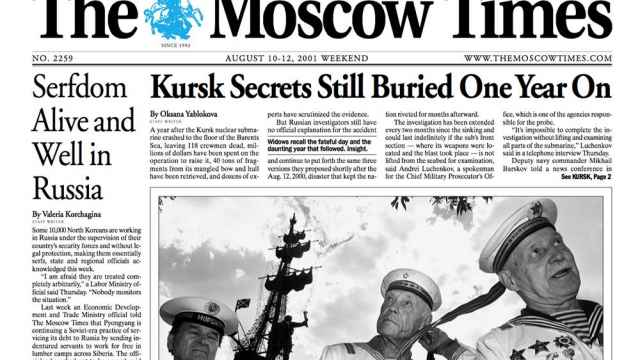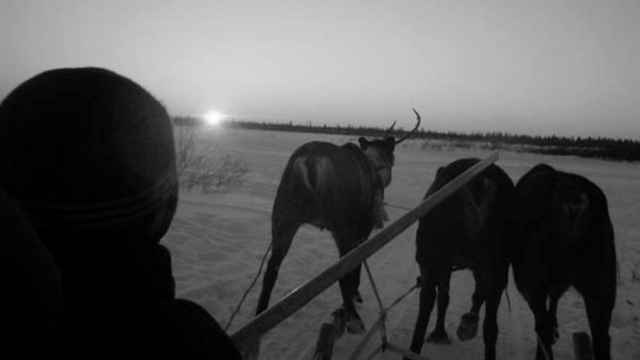I’ve always wondered about that Life magazine cover in the Diner — the one with two schoolboys, one Russian, one American, staring out of the cover. Forty years ago, in an attempt to explain why the Russians were winning the space race, the glossy weekly published exclusive pictures of a Russian schoolboy and his American counterpart. They called it “Crisis in Education.”
The photographs on the front couldn’t be more stereotyped. Standing in front of a pile of snow, Alexei Kutzkov of Moscow wears a black fur hat and sports his first downy moustache confidently on his top lip. His eyes are narrowed, his jaw firm, and he looks set for a career in the KGB Interrogations and Roastings wing.
The only roasting Stephen Lapekas of Chicago looks as though he’s had is on Sunday with mashed potatoes and plenty of gravy. He’s a goofy American school kid with a grin straight out of a Colgate ad and a crew cut on his head. If he doesn’t end up opening fire in a crowded shopping mall, he’ll probably go into insurance.
Or so I thought. Actually, though they never met, Kutzkov and Lapekas both went into aviation. After school, Kutzkov stopped playing volleyball for the Spartak Masters and went to studyat the Technical Aviation Institute. In 1963, he started work at the tiny Sheremetyevo airport as a junior technician.
“There wasn’t much to the place then,” he said. “Just trees and shrubs and the odd plane landing now and then.”
The following year, Kutzkov headed back to the ivory towers to study civil aviation before becoming a full-blown engineer at the State Department of Aviation. Most of his time was dedicated to investigating air crashes.
“I was sent all over the place,” he said. “There were crashes everywhere — in the mountains, in the tundra, in the taiga.”
He has also traveled all over the world giving lectures on aviation at universities everywhere from Australia to Alaska.
“America is a wonderful place,” he said. “We used to be superpowers together, but now Russia is nothing at all. Even our aviation industry, which used to be the best in the world, is dying out.”
These days Kutzkov is technical director of the Sever Aero aviation company. He lives with his wife and son in a tiny apartment near Aeroport metro.
“I didn’t marry the girl I was dating in the Life article,” he said sadly. “She married my best friend.”
Meanwhile, Steve Lapekas was listening to rock-and-roll and swimming for his school team." All we ever heard about back in the fifties was the space race and how we were lagging behind the Russians," he said. “That and Elvis Presley.”
Lapekas graduated from the University of Illinois with a degree in physical education before going on to military college. His five years of active duty included an eight-month stint in Vietnam, where he manned an airborne radio and television station broadcasting to American troops.
After that, he did reconnaissance trips to the North and South Poles before joining the staff of TWA, where he has worked as a pilot for the last 30 years. Lapekas has two children from his first wife, two from his second, two grandchildren and two divorces.
“The article in Life magazine was less than flattering,” he said. “They made me out to be some goofball who spent all his time dancing. I got a lot of mail afterwards saying not to worry — we’d beat Khrushchev and the Sputnik in the end.”
Lapekas has never been to Russia. “I would love to have seen it 40 years ago, when they wrote about me,” he said. “Now it sounds as though it’s been Westernized, but those photographs of Kutzkov at school look like a different world.”
Originally published on Nov. 28, 1998
A Message from The Moscow Times:
Dear readers,
We are facing unprecedented challenges. Russia's Prosecutor General's Office has designated The Moscow Times as an "undesirable" organization, criminalizing our work and putting our staff at risk of prosecution. This follows our earlier unjust labeling as a "foreign agent."
These actions are direct attempts to silence independent journalism in Russia. The authorities claim our work "discredits the decisions of the Russian leadership." We see things differently: we strive to provide accurate, unbiased reporting on Russia.
We, the journalists of The Moscow Times, refuse to be silenced. But to continue our work, we need your help.
Your support, no matter how small, makes a world of difference. If you can, please support us monthly starting from just $2. It's quick to set up, and every contribution makes a significant impact.
By supporting The Moscow Times, you're defending open, independent journalism in the face of repression. Thank you for standing with us.
Remind me later.






